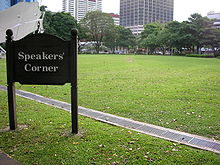-
Advocacy Theme
-
Tags
- Abortion
- Adoption
- Caregiving
- CEDAW
- Disability
- Domestic Violence
- Domestic Workers
- Harassment
- Healthcare
- Housing
- International/Regional Work
- Maintenance
- Media
- Migrant Spouses
- Migrant Workers
- Muslim Law
- National budget
- Parental Leave
- Parenthood
- Polygamy
- Population
- Race and religion
- Sexual Violence
- Sexuality Education
- Single Parents
- Social Support
- Sterilisation
- Women's Charter
“Controversial” issues need more voices, not fewer
November 10th, 2016 | Letters and op-eds, LGBTQ, News, Views
An edited version of this letter was published in The Straits Times on 10 November 2016.
 The latest changes to conditions for Speaker’s Corner events and indoor assemblies suggest a troubling closing off to different perspectives (“Keeping domestic issues for locals”, 1 Nov).
The latest changes to conditions for Speaker’s Corner events and indoor assemblies suggest a troubling closing off to different perspectives (“Keeping domestic issues for locals”, 1 Nov).
Citizens have the greatest stake here. The most fundamental rights of decision-making, the rights to vote and stand for political office, are therefore reserved by nationality.
However, a bright line is not necessary when it comes to hearing different points of view.
We find that our work has much in common with gender equality advocacy all over the world. The movement for women’s rights is a global one, and we benefit from mutual learning and support with foreign counterparts.
In the context of regulated speech in Singapore, the possibility of nefarious foreign manipulation through speech should not be exaggerated.
To be exempted from police permits, Speaker’s Corner events and indoor assemblies must in any case feature exclusively Singaporean speakers and organisers.
Restrictions on foreign funding thus hamper events that are controlled by citizens to begin with. Rather than remove foreign voices, this makes it harder for locals to be heard.
In the case of Pink Dot, sponsorship was transparent – the foreign companies were not masquerading as local. People who regard foreign support with suspicion could form their own opinions accordingly.
Are the new rules inspired by an inaccurate belief that LGBT experiences have a foreign origin? Southeast Asia has a rich history of gender and sexuality diversity.
Even if foreign support brings in new perspectives, is this undesirable?
The Singapore state itself recognises the value of international perspectives on social matters. For instance it joins global treaties on the rights of women, children and people with disabilities. Recently, it invited a United Nations expert on the rights of older people to visit.
If the state shares feedback with other countries on various matters, why shouldn’t the people engage in mutual exchange and support with foreigners?
Foreigners, as residents, have particular stakes in some issues. Domestic workers and their compatriots have compelling reasons to support events discussing their experiences. Similarly, foreign spouses of citizens may wish to engage issues that affect them and their citizen children.
Society benefits from chances to connect over contested issues in person, not only online. Rather than policing who speaks and who supports them, let us hear what they say. It is better to hear too many voices than too few.



